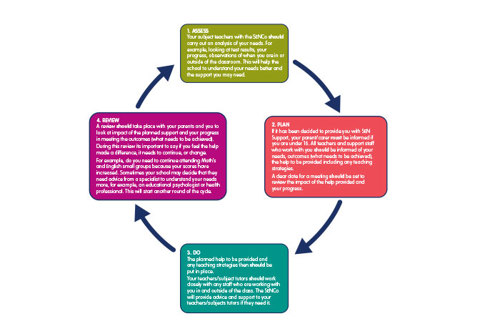Do you find learning or taking part at school a struggle and need extra or different types of help, compared to other students of the same age?
Are you aged between 0 and 25 years old? If yes, this may mean you have special educational needs (SEN)!
Examples of SEN
You may have special educational needs if you have one or more of the following difficulties with:
- Math’s or English (spellings, writing, or reading)
- Concentration/focusing in class
- Speaking or understanding what’s been said
- Seeing or hearing
- Anxiety or feeling depressed
- Making or keeping friendships
- Getting frustrated or angry often
- Walking, using your arms, or hands
- Sensitivity to noise and big crowds
- Health needs that make it difficult to learn
The extra or different types of help you may be provided with at school, if you have SEN, is known as SEN provision.
Examples of SEN Provision
SEN provision can include:
- Extra help with your subjects, i.e. maths and/or English
- Working in a small group for certain subjects
- Homework club
- Dyslexia ruler
- Time out card
- A mentor or someone to talk to
- Learning support in class, e.g. a teaching assistant
- ELSA (emotional literacy support assistant)
- Larger fonts and coloured backgrounds
- Visual timetables and/or checklists
- Extra time in exams
- A quiet space to have lunch
- Therapies, such speech and language therapy or occupational therapy
What can I do if I think I have or may have special educational needs?
Speak to your form tutor (or a member of staff you get on with) and your parent/carer, so an appointment can be made to discuss this with the school’s SENCo (Special Educational Needs Co-ordinator).
The SENCo’s role is to make sure that your needs are identified, letting school staff and your parent/carer know what help you need.
What should school do next?
After your meeting with the SENCo it may be agreed for the school to provide you with SEN Support.
This cycle is made up of four stages:
- Assess
- Plan
- Do
- Review
This will hopefully make sure that your needs are better understood and you are provided with the right help so you can learn better and take part at school.
The SEN Support Cycle
The diagram below tells you what happens at each stage of the cycle. You and you parents must be at the centre of this cycle which means your views, wishes, and feelings must be considered at each stage of this cycle.

Getting extra or different types of help at school: SEN support
Requesting an Education, Health Care Needs Assessment
If you, your parent/carer, or school feel that you have not made enough progress or you are still struggling despite the help provided during the SEN support cycles, a decision may be made by your school and your parent/carer’s for an EHC Needs Assessment to be requested.
This request is usually made, so your school can get extra money from the council, usually referred to as the local authority (LA) to give you more help or to continue with the help you are already getting. Find out more information about EHC Needs Assessments.
How we can help
We can:
- Go through any questions you have about this cycle
- Support you and your parent/carer to give your views during the cycle
- Help you and your parent/carer to take part in meetings about your SEN and the help you need
- Provide your option, when your parent/carer or you are not in agreement with the help your school is providing
How to contact us
You can contact us by:
- Telephone: Call or text our children and young people’s officer on 07917 504390 or call our office helpline number on 020 8871 8065
- Email: You can email us at wiass@wandsworth.gov.uk

